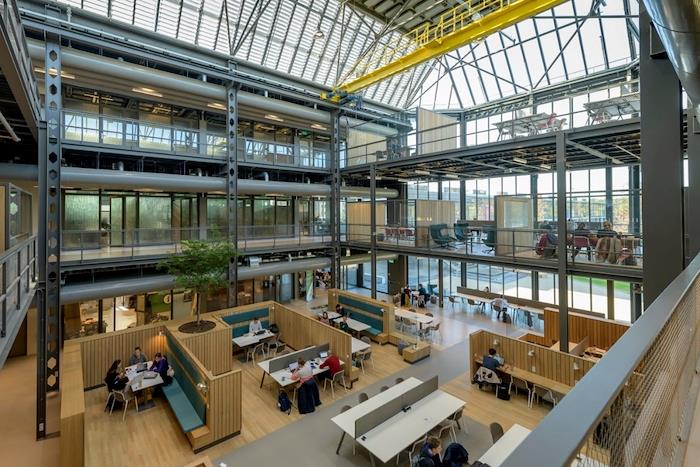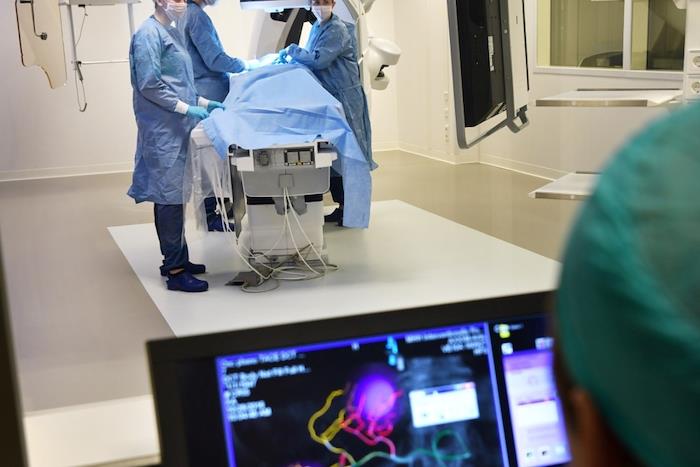In short
- Researchers work together with the business community, hospitals and students in the TechMed Centre, to stimulate innovation in healthcare
- The corona crisis made it more evident than ever that innovation in healthcare is of vital importance
Global Goal

Anyone who walks around in the TechMed Centre will feel like they are in a hypermodern hospital. There are reconstructed intensive care rooms and a real operating theatre with a robotic arm and X-ray scanners, MRI scanners and a testing house for technology in
Home-care. Everything here is focused on the care of the future. Students work side by side with people from companies and hospitals to make that care as good as it can be. “This combination is special. We link daily practice in everything that is researched. Doing this allows us to know what works and what does not immediately. That would not be possible without hospitals and companies”, Burie explains.
TechMed Event
It became evident how important stimulating innovation in healthcare is only shortly after the opening of the TechMed Centre: the corona crisis made us face the facts. The TechMed Centre launched various initiatives to support the healthcare sector in tackling this crisis. From rapidly training medical professionals to developing new solutions for ventilation. For example, the TechMed Centre came up with a smart solution with which the demand for respiratory equipment could be met, using resources that were already available.

There are collaborations with several parties in the region: Roessingh Research & Development and hospitals MST and ZGT, among others. “We work together. Students can work in hospitals during their internships, and medical professionals give lectures at the UT. On the other hand, hospitals can also find rooms here for experiments. You cannot just use the actual operating room in a hospital for this. It is often fully booked and there also numerous regulations for what is and is not allowed in there. Healthcare institutions and companies can use our labs and research rooms. New ideas and lines of research are also created because they meet students and researchers here.
ere are also close ties with the business community, from SMes such as Demcon and Micronit to global players such as Siemens and Philips. “The fact that we also work with these large companies is interesting for SMEs in this region. These large companies almost force innovation to come. But, being an entrepreneurial university, we are also working on getting innovations to the market through start-ups. We do this via Novel-T, for example. The goal is that such a start-up will be able to stand on its own two feet after some years, and then perhaps be bought up again by a larger party.” There is already a large network, but new entrepreneurs that also want to work together are still joining. “We also get requests from abroad, from companies that want to settle here.”
Related articles
No patients are treated at the TechMed Centre. But they do go there for testing technological innovations, such as laser shoes that make it easier for Parkinson’s patients to walk. “Those tests with patients reveal that you might need to adjust your ideas. They benefitted more from a laser in their shoes than from smart glasses. And we are even working on vibrating socks, now. Other developments that we are working on include a new method of breast examination that is a lot less painful than the current mammography and new hydrogels that can be used in a kind of injectable plaster for cartilage defects in knees, for example. These developments will help prevent further problems and ultimately the need for an artificial knee, where possible. A house has also been built, in which new technology for home care can be tested.

Students from medical studies such as Biomedical Engineering, Health Sciences and Technical medicine are not the only students that you will find in the centre. Students from other disciplines such as Industrial Design, Psychology, Electrical Engineering and other technical studies also find their way here. “They bring their expertise. Industrial Design is working on an interactive table that can stimulate healthy eating habits, for example. Psychology and ethics students are researching the acceptance of new technologies by patients and healthcare workers. The centre has common ground with almost all our studies.” The University of Twente is working together with Saxion, ROC van Twente and various regional companies as part of the Regional deal, in the Topfit Cititzenlab project. “We want to involve citizens and healthcare professionals in the new technology. What is needed? The people that work with the patients need to be involved when we come up with new technology. They are the ones who will soon be using them, and they can ensure that it is introduced and accepted in the workplace. We need to work together as educational institutions to optimise the entire healthcare chain.”
Burie, who studied mechanical engineering, sees his enthusiasm reflected in the students and researchers. “They want to do work that is relevant and has a big impact on society. Healthcare is a challenging and complex sector. We work on solutions for those challenges at the TechMed Centre. That is precisely why it is so important that researchers, entrepreneurs and students meet here and work together on new innovative ideas.”
Date: 23 July 2020 |
Source of tekst: INN' Twente |
Author: INN' Twente





